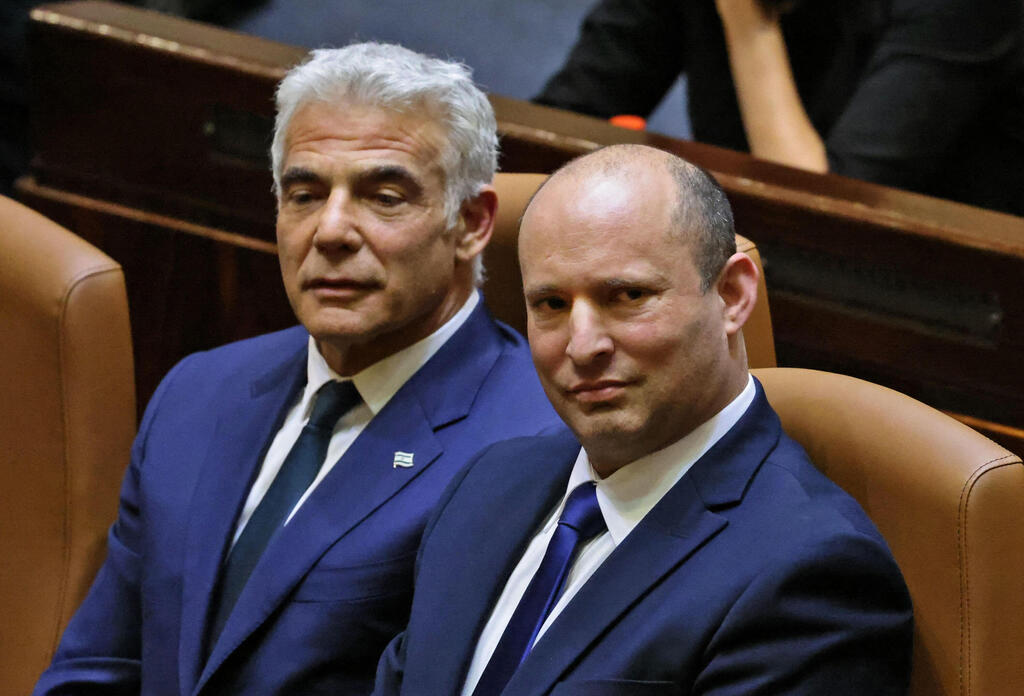Getting your Trinity Audio player ready...
A new government of the State of Israel is embarking on its term in office in the wake of the tumultuous months since the March 23 elections.
Many Israelis have modest hopes for this new government, such as passing a budget and going about the business of governing.
4 View gallery


Foreign Minister Yair Lapid and Prime Minister Naftali Bennett at the Knesset plenum Sunday
(Photo: AFP)
Israelis who were vying for a new government had almost lost hope that it would actually be established after so many disagreements among its members and efforts by the outgoing coalition to ensure its failure.
Obviously, this is a fragile union and its members must accept that many of their core policies would be ignored.
The opposing political camp regards the new government as one born of sin and views its inception with disappointment and concern.
The healing within Israeli society that has been the stated aim of the new government will not happen overnight. The previous government established an inner cabinet dedicated to ending rifts among Israelis but that was no more than a joke.
Small changes made by the new coalition would be enough to begin the process, but they must include the generosity of victors and an honorable approach, devoid of hubris, toward the losing camp.
4 View gallery


Thousands gathering to celebrate the new government at Tel Aviv's Rabin Square Sunday
(Photo: AFP)
The celebrations in Tel Aviv by those who have been calling for Netanyahu's ouster contribute nothing to healing the rifts.
Former prime minister Benjamin Netanyahu's most ardent opponents, those who said they would leave the country if he were not ousted from power and who appeared outside his Jerusalem residence every week to demonstrate against him, know how it feels to be the losing side.
This division between "us" and "them", which automatically divides the country, has birthed the concept of first and second-class citizens. The divisive rhetoric over recent years served only those politicians who chose to brand other Israeli citizens as traitors.
Bennett's own Yamina party members and constituents had to learn the hard way how damaging and hateful such rhetoric can be when they themselves came under attack for joining the "coalition for change."
4 View gallery


Demonstrators outside the home of Yamina No. 2 Ayelet Shaked earlier this month, accusing her and Naftali Bennett of cooperating with supporters of terrorism
(Photo: Shaul Golan)
The government's first mission has to be to create a unified public space that does not divide Israelis into separate tribes but aspires to a new unity of purpose — especially with those now in the opposition.
There are many ways to promote such a vision, including giving those who now feel disenfranchised an opportunity to speak, opening political discourse in the Knesset and even in the government — to include members of the public as well.
The government should first reach out to Israelis who do not live in the heart of the country or enjoy the benefits of the socioeconomic elite - not only because it would be a wise political move but also - and above all - because it is the right thing to do.
Massive investment in education, transportation, health and social services in the north and south are crucial but not enough.
Real partnership will come when those citizens are given representation in the corridors of power. They should be among those tapped to fill new government jobs, be assigned as advisors and spokespeople.
It would be a mistake for ministers to only fill positions with those in their own camp, who think and speak like them.
A Haredi person raised in the southern city of Arad or an office administrator from Ramle could enrich any ministry with a new and valuable perspective.
Israeli of all stripes should actively find a way to connect with those who hold different views, for the sake of the country.


